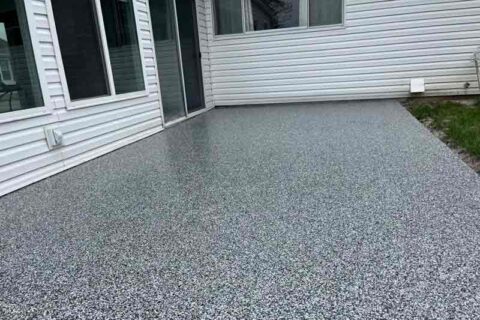Epoxy vs. Polyurea
At Fortress Floors Midwest Pro we use a 100% Polyurea Basecoat along with our Polyaspartic Top Coat. Together they make our concrete floor coatings 4x’s stronger than Epoxy. We often get asked why our customers choose our Polyurea based concrete coatings vs. an Epoxy concrete coating? Here are some key differences between the two:
- Adhesion: Polyurea concrete coatings have better adhesion to a variety of surfaces, including concrete and metal, compared to epoxy concrete coatings.
- UV Resistance: Our Polyurea concrete coatings have 100% UV protection vs epoxy coatings that can fade or yellow when applied to areas in direct sunlight. This is important when considering outside applications such as patios, porches, pool decks, sidewalks, driveways etc.
- Temperature Tolerance: Polyurea coatings can withstand higher temperatures than epoxy coatings. This is important especially when it comes to hot car tires. With epoxy concrete coatings hot tires can leave rubber transfer or black marks, Polyurea based coatings will hold up under those hot tires.
- Durability: Polyurea coatings are highly durable and can withstand heavy traffic, impact, and abrasion. They can also resist chipping, peeling, and fading.
- Fast Curing Time: Polyurea concrete coatings have a faster curing time than epoxy coatings, which means they can be installed quickly and efficiently. This makes them an ideal choice for projects with tight deadlines. We can install most garages in 1 day. Where with epoxy the longer drying times makes the entire process longer.
Polyurea is a popular choice for concrete coatings due to its numerous benefits. Here are some additional benefits of using polyurea on concrete coatings vs epoxy concrete coatings:
- Seamless Finish: Polyurea coatings can be applied as a seamless finish, which means there are no joints or seams for dirt and bacteria to accumulate. This makes them an excellent choice for areas that require high levels of hygiene, such as hospitals, food processing plants, and laboratories.
- Chemical Resistance: Polyurea coatings are highly resistant to chemicals, such as acids, oils, and solvents. This makes them an ideal choice for industrial facilities where spills and leaks are common.
- Waterproofing: Polyurea coatings are highly waterproof and can prevent water from penetrating the surface. This makes them an excellent choice for areas that are exposed to moisture, such as basements, pool decks, and balconies.
- UV Resistance: Polyurea coatings have excellent UV resistance and can withstand exposure to sunlight without fading or yellowing.
- Versatility: Polyurea coatings can be installed on a variety of surfaces, including concrete, metal, wood, and fiberglass. They can also be customized to meet specific design requirements, such as texture, color, and pattern.
Overall, both epoxy and polyurea coatings have their own unique advantages and disadvantages. The choice of coating depends on the specific requirements of the application, such as the type of surface, expected environmental conditions, and required durability. It is important to consult with a professional to determine which coating is best suited for your needs.
Polyaspartic clear coat is a type of coating used to protect and enhance the appearance of floors, walls, and other surfaces. Here are some benefits of using polyaspartic clear coat:
- Fast Curing Time: Polyaspartic clear coat has a fast curing time, which means it can be installed quickly and efficiently. It can also be used in cold temperatures, making it an ideal choice for projects in colder climates.
- High Durability: Polyaspartic clear coat is highly durable and can withstand heavy traffic, impact, and abrasion. It can also resist chipping, peeling, and fading.
- Chemical Resistance: Polyaspartic clear coat is highly resistant to chemicals, such as acids, oils, and solvents. This makes it an ideal choice for industrial facilities where spills and leaks are common.
- UV Resistance: Polyaspartic clear coat has excellent UV resistance and can withstand exposure to sunlight without fading or yellowing. This makes it an excellent choice for outdoor applications, such as patios and pool decks.
- Clarity: Polyaspartic clear coat has a high level of clarity, which means it does not yellow over time. This makes it an ideal choice for projects where maintaining the appearance of the surface is important.
- Versatility: Polyaspartic clear coat can be used on a variety of surfaces, including concrete, metal, wood, and fiberglass. It can also be customized to meet specific design requirements, such as texture, color, and pattern.
Overall, polyaspartic clear coat offers numerous benefits for protecting and enhancing the appearance of floors, walls, and other surfaces. Its fast curing time, high durability, chemical and UV resistance, clarity, and versatility make it an excellent choice for a variety of applications. When choosing a polyaspartic clear coat, it is important to consult with a professional to determine the best product for your specific needs.

